| Srl | Item |
| 1 |
ID:
109532


|
|
|
| 2 |
ID:
104871
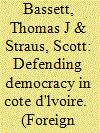

|
|
|
| 3 |
ID:
107596


|
|
|
|
|
| Publication |
2011.
|
| Summary/Abstract |
Despite the fall of the Qaddafi regime in Libya, humanitarian intervention still has plenty of critics. But their targets are usually the early, ugly missions of the 1990s. Since then -- as Libya has shown -- the international community has learned its lessons and grown much more adept at using military force to save lives.
|
|
|
|
|
|
|
|
|
|
|
|
|
|
|
|
| 4 |
ID:
109518
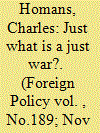

|
|
|
| 5 |
ID:
104858
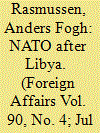

|
|
|
| 6 |
ID:
110918
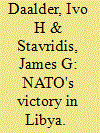

|
|
|
|
|
| Publication |
2012.
|
| Summary/Abstract |
NATO's operation in Libya has rightly been hailed as a model intervention. The alliance responded rapidly to a deteriorating situation that threatened hundreds of thousands of civilians rebelling against an oppressive regime. It succeeded in protecting those civilians and, ultimately, in providing the time and space necessary for local forces to overthrow Muammar al-Qaddafi. And it did so by involving partners in the region and sharing the burden among the alliance's members.
NATO's involvement in Libya demonstrated that the alliance remains an essential source of stability. But to preserve that role, NATO must solidify the political cohesion and shared capabilities that made the operation in Libya possible -- particularly as its leaders prepare for the upcoming NATO summit in Chicago this May.
|
|
|
|
|
|
|
|
|
|
|
|
|
|
|
|
| 7 |
ID:
137576
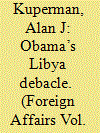

|
|
|
|
|
| Summary/Abstract |
On March 17, 2011, the UN Security Council passed Resolution 1973, spearheaded by the administration of U.S. President Barack Obama, authorizing military intervention in Libya. The goal, Obama explained, was to save the lives of peaceful, pro-democracy protesters who found themselves the target of a crackdown by Libyan dictator Muammar al-Qaddafi. Not only did Qaddafi endanger the momentum of the nascent Arab Spring, which had recently swept away authoritarian regimes in Tunisia and Egypt, but he also was poised to commit a bloodbath in the Libyan city where the uprising had started, said the president. “We knew that if we waited one more day, Benghazi—a city nearly the size of Charlotte—could suffer a massacre that would have reverberated across the region and stained the conscience of the world,” Obama declared. Two days after the UN authorization, the United States and other NATO countries established a no-fly zone throughout Libya and started bombing Qaddafi’s forces. Seven months later, in October 2011, after an extended military campaign with sustained Western support, rebel forces conquered the country and shot Qaddafi dead.
|
|
|
|
|
|
|
|
|
|
|
|
|
|
|
|
| 8 |
ID:
115843
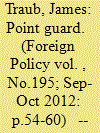

|
|
|
| 9 |
ID:
107597


|
|
|
|
|
| Publication |
2011.
|
| Summary/Abstract |
InIntervening militarily to save lives abroad often sounds good on paper, but the record has not been promising. The ethical calculus involved is almost always complicated by messy realities on the ground, and the opportunity costs of such missions are massive. Well-meaning countries could save far more lives by helping refugees and victims of natural disasters and funding public health.
|
|
|
|
|
|
|
|
|
|
|
|
|
|
|
|
| 10 |
ID:
047125
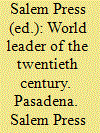

|
|
|
|
|
| Publication |
Pasadena, Salem Press INC, 2000.
|
| Description |
2v. (xx, 419-838p.)Hbk
|
| Series |
Magill's Choice
|
| Contents |
Vol. II.: William Lyon Mackenzie King-Boris Yeltsin
|
| Standard Number |
0893563374
|
|
|
|
|
|
|
|
|
|
|
|
Copies: C:1/I:0,R:0,Q:0
Circulation
| Accession# | Call# | Current Location | Status | Policy | Location |
| 044333 | 920/SAL 044333 | Main | On Shelf | General | |
|
|
|
|